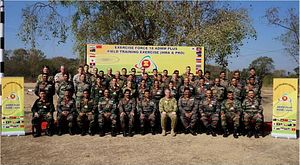As I wrote late last month, from March 2 to March 8, India hosted its first multilateral exercise with regional countries (See: “India Hosts First Multilateral Military Exercise With Asian Nations”).
The field training exercise (FTX), called “Force 18,” involved the ten countries of Southeast Asia along with their eight dialogue partners – India, Australia, China, Japan, New Zealand, Russia, South Korea, and the United States – under the framework of the ASEAN Defense Ministers’ Meeting Plus (ADMM Plus), which is emerging as the premier venue for defense and security issues in the region. According to the Indian defense ministry, it was the first-ever multinational exercise ever conducted by ground forces on Indian soil.
Addressing over 300 foreign participants and observers at the closing ceremony of Force 18, India’s army chief General Dalbir Singh said the seven-day long exercise, which focused on humanitarian mine action (HMA) and peacekeeping operations (PKO), was a “watershed event” in the history of the ADMM-Plus forum.
“It has showcased perfect harmony among the ASEAN Plus Nations in the field of humanitarian mine action and peacekeeping operations,” he said.
Both areas are of importance to ASEAN countries as well as their dialogue partners. On mining, several ASEAN countries – including Vietnam, which is co-chairing the humanitarian mine action initiative with India – continue to grapple with problems from unexploded ordnances (UXOs) after having been through deadly wars. ASEAN is also setting up a regional mine action center in Cambodia. Given this, Pratap Parameswaran, the director for political and security affairs at the ASEAN Secretariat, said that the exercises would allow ASEAN member states to take back some lessons learned and apply it to ongoing efforts within the regional body.
“[W]e…are taking back some of the principles, the best practices and experiences that we have learnt from our dialogue partners, including India, and would try and have it institutionalized and practiced back in the respective ASEAN countries,” Parameswaran told reporters at the conclusion of the exercises.
And on peacekeeping, while ASEAN remains far from the more ambitious goal of a regional peacekeeping force, as I’ve written previously, most ASEAN countries have participated to varying degrees in UN peacekeeping operations and have already set up national peacekeeping training centers (See: “Malaysia Wants an ASEAN Peacekeeping Force”). Yet some Southeast Asian states are still newcomers in this field and can benefit from more experience as well as the sharing of best practices, including from India, which is the world’s third largest contributor to United Nations peacekeeping missions.
“The [expert working] group has been able to successfully establish a robust platform for United Nations peacekeepers to provide necessary contributions towards peace and security in the region,” Singh said.
The closing ceremony of Force 18 also featured a 40-member Indian army contingent led by a woman officer, Lt Col Sophia Qureshi – a notable first.

































